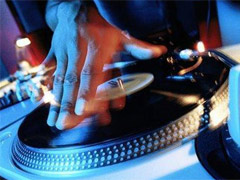


When you’re swaying on the dancefloor do you ever wonder about the blood, sweat and tears that go into staging a club night? The path can be a winding and obstacle-filled one, particularly when it comes to certain types of music.
First and foremost, a thirsty audience is required, as the venue’s main concern will be the takings at the bar. The promoter needs to persuade the venue that they will attract enough punters to make them money, then ensure their promises become reality if they want to get booked again. In a city as competitive as London it’s difficult to drag people to anything, particularly when your main guy is a DJ who makes great beats but has never been seen outside his mum’s basement. Naturally, certain events are simpler to host than others. “It’s way easier to have a guy in the corner with an acoustic guitar and a little PA than put on a huge light show, but it depends what the venue really wants” says Jules Parkinson, Membership Development, PRS for Music.
Planning is key, and the promoter should start advertising their show a few months in advance. “Build a relationship with local reviewers, and obviously listings in great sites like All in London and Time Out. Treat the bands well and if you can afford to pay them or give them a couple of drinks the bands will remember and your reputation as a promoter will spread. A lot [of promoters] don’t seem to care, so the good ones do stand out. If the bands like you then you’re more likely to get better bands and better audiences.”
\n\nSo a fair bit of smooching then, however over the last four years something appears to put certain promoters at a disadvantage no matter how well they do their homework. A piece of paper called Risk Assessment 696 has been making headlines since its introduction into London’s club scene in 2006. When the form first appeared it asked specific questions about the ethnic groups that would be attending an event, and cited “bashment and garage” as examples of the music that might be played. This singling out of ethnicity and genre angered music organisations and promoters alike, and in 2009 the form was reviewed. The aforementioned questions were removed and the overall document was simplified, however it is still “primarily intended for large promoted events between 10pm and 4am which feature MCs and DJs performing to recorded backing tracks rather than live music events.” What forms of music contain an MC performing to a backing track? Hip hop, garage, bhangra, grime, ragga, reggae…
“It was allegedly brought in because the Met police were concerned that there were greater acts of violence at say, a grime or urban gig” says Parker. According to Alex Stephens from the Metropolitan Police, the form “is a voluntary risk assessment form which aims to help owners of music events to provide a safe working and leisure environment for all those who attend events and promotions. It is intended to identify where an event might be at risk from crime and take steps to prevent it. To date shootings linked to licensed premises have been significantly reduced and we believe the risk assessment process has contributed to this.” While the form is voluntary to some, certain boroughs have chosen to make it a requirement of the licence, mostly in the case of venues where there have been incidents in the past.
\n\nIt’s naïve to deny there is an area of British music that rivals American gangster rap in terms of aggressive lyricism, just listen to the words on Lethal Bizzle’s ‘Pow!’ (I’ll crack your skull/leave you f***ed up in da wheelchair), a track that reached number 11 in the UK singles chart in 2005. This is the type of music that makes the Met (and in turn club owners) nervous, but how do the promoters and artists themselves perceive it? “Club owners don’t want any “urban trouble” in their clubs, because the police have probably threatened them with the loss of their club licence if they do” says Mikey D.O.N., promoter and rapper with Krispy 3. “Since the police have got at them to say hip hop and grime nights are number 1 on their hate list, they just want to shut down the scene. All in all, the police are scared of the power that urban kids possess when they congregate and do not know how to police them.”
Once form 696 is received by police, how do they decide that an event has the potential to turn violent? “The risk level is assessed on information about the venue, including recent crime figures linked to the venue, the number of door staff and the number of people attending the event” says Stephens. If information is missing, or the form is late (it has to be submitted 14 days before the event) it can result in cancellation. Two events were cancelled in 2010 as a result of late submission (out of a total of seven), meaning there wasn’t necessarily any risk of the event turning violent, but the additional bit of paperwork stood in the way – extra bureaucracy that only applies to music of black origin.
If that wasn’t enough, apparently hip hop audiences don’t booze enough either. “I’ve heard a lot of club owners complain that hip hop heads don’t spend enough on drinks” says King Kaiow, rapper with IRS. While it may seem that the odds are stacked against you if you’re trying to host a hip hop or grime night, one look at the singles charts reveals a top 10 filled with guest star collaborations from rappers and R&B-influenced melodies, while artists like Kano and Tinchy Stryder (not to mention Dizzee Rascal) have long been part of the mainstream music scene – some may say there’s never been a better time for promoters.


